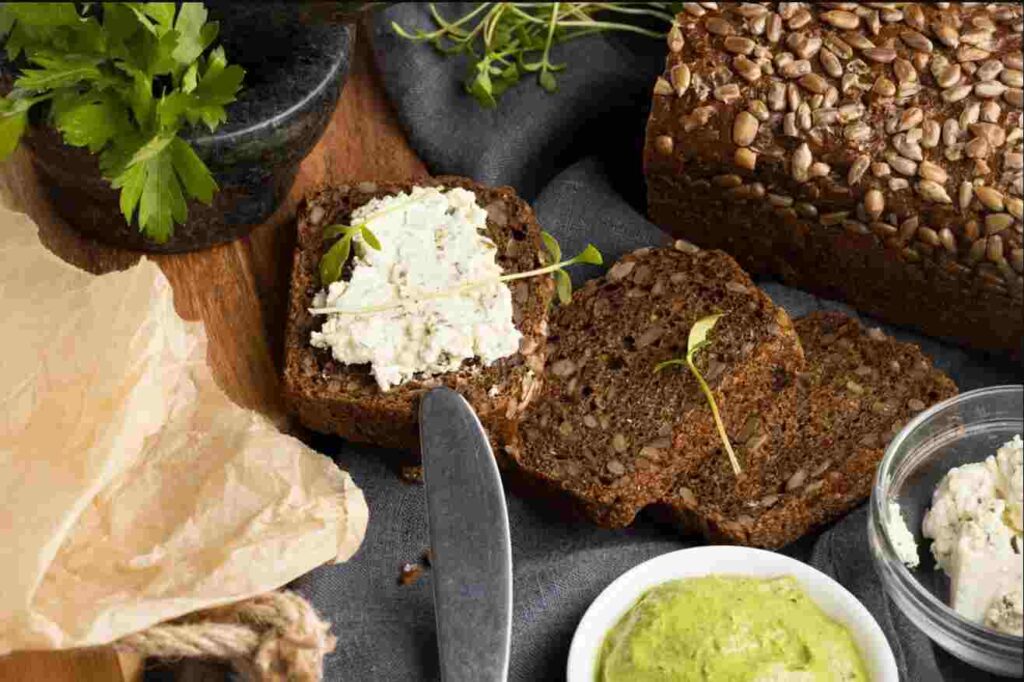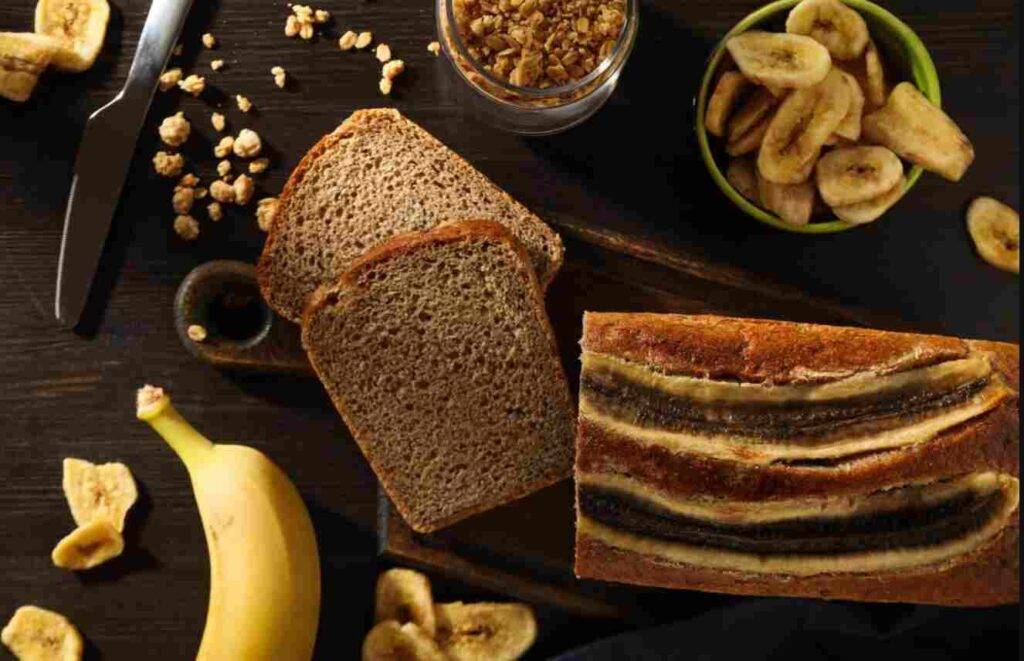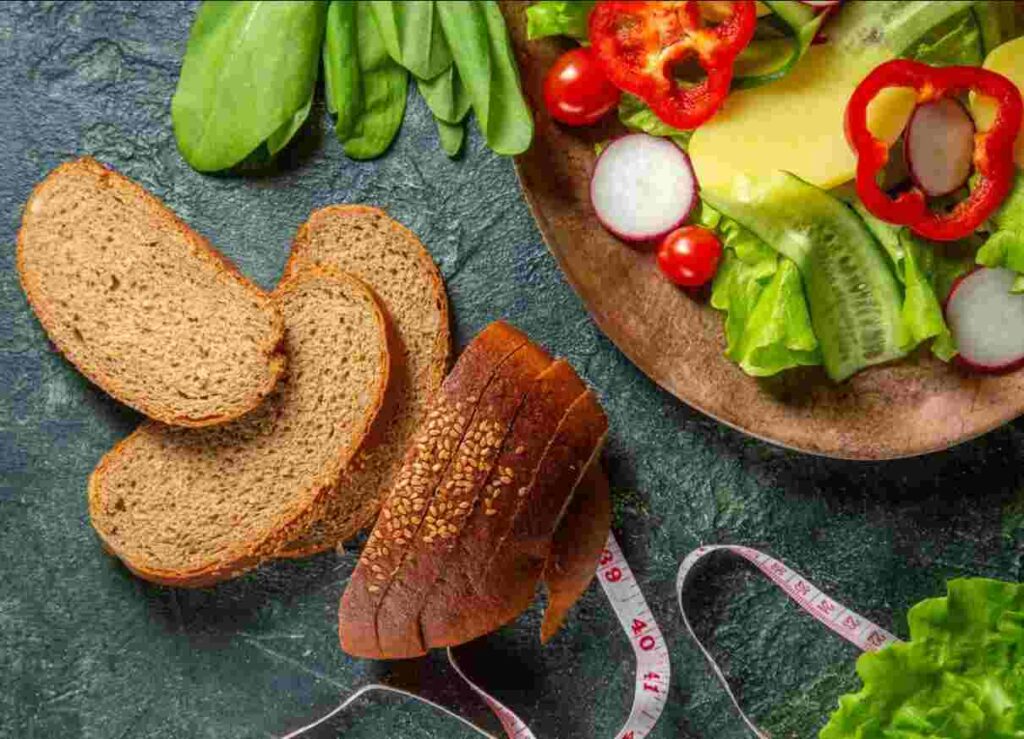Keto bread has gained popularity as a low-carb alternative to traditional bread, appealing to those following the ketogenic diet or looking to reduce carbohydrate intake.
Unlike conventional bread, which is made from wheat flour and high in carbs, keto bread is crafted from low-carb ingredients like almond flour, coconut flour, or flaxseed meal, making it a suitable choice for individuals on a low-carb, high-fat diet.
But is keto bread actually healthy? While it offers benefits like blood sugar control, weight management, and a gluten-free option, it also has potential downsides, such as processed ingredients in store-bought varieties and high-calorie content.
We’ll explore the ingredients of keto bread, its nutritional benefits, potential concerns, and whether it’s a healthy addition to your diet. Let’s dive in and find out if keto bread is truly a smart choice for your health!
Ingredients in Keto Bread

Keto bread is crafted with specific low-carb, high-fat ingredients that set it apart from traditional wheat-based bread. These ingredients not only help keep the carb count low but also contribute to the texture and nutritional benefits of keto bread.
1. Almond Flour & Coconut Flour
One of the most common flour substitutes in keto bread is almond flour, which is packed with healthy fats, fiber, and protein while being naturally low in carbohydrates.
Another popular choice is coconut flour, which is high in fiber and provides a slightly sweet taste. Unlike refined wheat flour, these alternatives have a minimal impact on blood sugar levels and support ketosis.
2. Eggs & Dairy
Eggs play a crucial role in keto bread, acting as a binding agent while adding protein and healthy fats. Some recipes also include cream cheese, butter, or Greek yogurt to improve texture and provide additional fat, which is essential for maintaining a ketogenic diet.
3. Psyllium Husk & Flaxseed
To mimic the structure of traditional bread, many keto bread recipes incorporate psyllium husk or flaxseed meal.
These ingredients add fiber, improve moisture retention, and give keto bread a softer, more bread-like consistency. Additionally, they promote gut health by aiding digestion and supporting a balanced microbiome.
4. Butter or Olive Oil
Fats like butter, ghee, and olive oil are often added to keto bread to enhance its richness and moisture while keeping it keto-friendly.
Unlike the vegetable oils commonly found in processed breads, these fats offer a healthier profile, with olive oil providing heart-healthy monounsaturated fats.
How Keto Bread Compares to Regular Bread
| Ingredient | Keto Bread | Regular Bread |
|---|---|---|
| Flour | Almond flour, coconut flour | Refined wheat flour |
| Binders | Eggs, psyllium husk, flaxseed | Gluten from wheat |
| Sweeteners | Usually none (or natural low-carb options) | Sugar, high-fructose corn syrup |
| Fats | Butter, olive oil, or cream cheese | Often low in fat |
| Carbs | Low (1-5g per slice) | High (15-25g per slice) |
| Fiber | High | Low (unless whole grain) |
By replacing high-carb ingredients with healthier alternatives, keto bread offers a satisfying way to enjoy bread without compromising ketosis or overall health. But how does it stack up nutritionally? Let’s take a closer look at its benefits.
Nutritional Benefits of Keto Bread

Keto bread offers several health benefits, particularly for those following a low-carb or ketogenic diet.
Its carefully selected ingredients make it a healthier alternative to traditional bread, providing essential nutrients while keeping carb intake low. Here’s a closer look at its key nutritional benefits:
✅1. Low in Carbohydrates
One of the primary benefits of keto bread is its low carbohydrate content, which makes it ideal for maintaining ketosis.
Unlike traditional bread, which can contain 15-20 grams of carbs per slice, keto bread typically has 2-5 grams of net carbs per serving.
This helps prevent blood sugar spikes and supports those managing insulin resistance, diabetes, or other metabolic conditions.
✅2. High in Healthy Fats
Since keto bread is often made with ingredients like almond flour, coconut flour, eggs, and butter, it provides a good source of healthy fats.
These fats are essential for those on a ketogenic diet, as they help maintain energy levels and support overall metabolic function.
Additionally, using olive oil or flaxseeds in keto bread can provide heart-healthy monounsaturated and omega-3 fatty acids.
✅3. Rich in Fiber
Many keto bread recipes incorporate fiber-rich ingredients like psyllium husk, flaxseed, and coconut flour, which aid digestion and promote gut health.
Fiber helps regulate bowel movements, supports healthy gut bacteria, and keeps you feeling full longer, reducing cravings and unnecessary snacking.
This is a stark contrast to traditional bread, which is often made with refined flour that lacks fiber and contributes to rapid blood sugar fluctuations.
✅4. A Good Source of Protein
Keto bread often contains eggs, nuts, and seeds, making it a moderate protein source. Protein is essential for muscle maintenance, tissue repair, and overall satiety.
Unlike many conventional breads that rely primarily on carbohydrates, keto bread offers a more balanced macronutrient profile, which can be beneficial for both weight management and overall health.
✅5. No Added Sugar
Many store-bought and homemade keto breads are free from added sugars, unlike traditional bread, which often contains hidden sugars to enhance flavor and texture.
By eliminating added sugars, keto bread reduces the risk of blood sugar spikes, insulin resistance, and inflammation, making it a healthier option for those looking to stabilize energy levels throughout the day.
With its low carb, high fat, fiber-rich, and protein-packed composition, keto bread can be a nutritious addition to a ketogenic or low-carb lifestyle.
However, while it offers numerous benefits, it’s essential to choose high-quality, minimally processed keto bread to maximize its health potential.
Up next, let’s explore whether keto bread is truly beneficial for weight loss and how it compares to traditional bread in terms of calories and satiety.
Is Keto Bread Good for Weight Loss?

Keto bread can be a valuable tool for weight loss, especially for those following a low-carb or ketogenic diet.
Because it is low in carbohydrates and high in healthy fats and fiber, it helps promote satiety, stabilize blood sugar levels, and reduce cravings, which are key factors in successful weight management.
How Keto Bread Supports Weight Loss
One of the biggest contributors to weight gain is high insulin levels caused by excessive carbohydrate intake. Traditional bread, made from refined wheat flour, spikes blood sugar levels, leading to a rapid increase in insulin production.
Elevated insulin levels promote fat storage and can lead to increased hunger, making it harder to maintain a calorie deficit.
In contrast, keto bread is low in carbs and often contains healthy fats and fiber, which slow digestion and minimize blood sugar fluctuations. This helps the body remain in ketosis, a metabolic state where it burns stored fat for energy instead of relying on glucose.
By avoiding carb-induced energy crashes and cravings, keto bread can support sustained energy levels and better appetite control throughout the day.
Calorie Considerations & Portion Control
While keto bread is a great low-carb alternative, it’s important to be mindful of its calorie content.
Some varieties—especially store-bought options—can be higher in calories than regular bread due to their increased fat content from ingredients like almond flour, butter, or cheese.
For example
A slice of traditional whole wheat bread (~70-80 calories)
A slice of keto bread (~90-150 calories, depending on ingredients)
For weight loss, portion control is key. While keto bread can help curb cravings and keep you full longer, consuming too many calories—even from healthy sources—can slow down weight loss progress.
Opting for homemade versions or checking labels for lower-calorie options can help you enjoy keto bread without exceeding your daily calorie goals.
Keto bread can be a beneficial addition to a weight loss plan, as it reduces blood sugar spikes, curbs cravings, and keeps you full longer.
However, keeping an eye on portion sizes and ingredient quality is essential to ensure it aligns with your overall weight loss strategy.
Potential Concerns & Side Effects of Keto Bread
While keto bread offers several benefits, there are some potential drawbacks to consider, especially for those who are not strictly following a ketogenic diet.
1. High in Calories & Fats
Many keto bread varieties contain more calories and fats than regular bread due to ingredients like almond flour, butter, and cheese.
While these fats are beneficial for keto dieters who rely on fat for energy, they may lead to excess calorie intake for those not in ketosis. Overconsumption without proper portion control could slow weight loss or even contribute to weight gain.
2. Processed Ingredients in Store-Bought Keto Bread
Not all keto breads are created equal. Many store-bought keto bread brands use preservatives, artificial fibers, and emulsifiers to enhance texture and shelf life.
Some of these additives, such as modified starches and synthetic fibers, may not align with a clean, whole-food-based keto diet. Choosing homemade or minimally processed keto bread can help avoid unnecessary additives.
3. Digestive Issues
Keto bread often contains high amounts of fiber from ingredients like psyllium husk and flaxseed, which can be beneficial for gut health.
However, excessive fiber intake—especially if your body isn’t used to it—may cause bloating, gas, or digestive discomfort.
Additionally, some keto breads use sugar alcohols (e.g., erythritol or sorbitol) as sweeteners, which can also lead to stomach upset in sensitive individuals.
4. Nutrient Deficiency
Since keto bread is made without whole grains, it may lack key micronutrients like B vitamins, iron, and magnesium, which are naturally present in whole wheat bread.
While keto bread supports a low-carb lifestyle, it’s important to incorporate other nutrient-rich foods like leafy greens, nuts, and seeds to ensure a balanced diet.
Keto bread can be a great low-carb option, but it’s important to choose high-quality, minimally processed varieties and watch portion sizes.
Being mindful of potential digestive issues and nutrient gaps can help you enjoy keto bread while maintaining a well-balanced diet.
Best Keto Bread Brands & Alternatives
For those following a low-carb or ketogenic diet, keto bread offers a satisfying alternative to traditional high-carb loaves. Whether you prefer store-bought convenience or homemade freshness, there are several options to explore.
Top-Rated Keto Bread Brands
While many brands claim to be “keto-friendly,” it’s essential to check the net carbs, ingredients, and overall nutritional value. Here are some of the best options:
✅ Sola Low-Carb Bread
Key Ingredients: Wheat protein isolate, oat fiber, sunflower oil
Net Carbs: ~2g per slice
Why It’s Popular: Soft texture and close to traditional bread taste
✅ ThinSlim Foods Zero Carb Bread
Key Ingredients: Wheat protein, oat fiber, flaxseed meal
Net Carbs: 0g per slice
Why It’s Popular: Completely carb-free with a light, airy texture
✅ Base Culture Keto Bread
Key Ingredients: Almond butter, eggs, golden flaxseed meal
Net Carbs: ~3g per slice
Why It’s Popular: Gluten-free, grain-free, and all-natural ingredients
✅ L’Oven Fresh Zero Carb Bread (Aldi’s Brand)
Key Ingredients: Wheat gluten, soybean oil, chicory root fiber
Net Carbs: 0g per slice
Why It’s Popular: Budget-friendly keto bread available in Aldi stores
Homemade Keto Bread: A Healthier Alternative
While store-bought keto bread is convenient, some brands contain preservatives, artificial fibers, and processed ingredients. Making keto bread at home allows for
✔ Healthier, whole-food ingredients
✔ Customizable flavors (e.g., adding herbs, cheese, or seeds)
✔ No hidden preservatives or fillers
A simple homemade keto bread recipe might include
Almond flour or coconut flour for the base
Eggs for structure and protein
Psyllium husk or flaxseed meal for fiber
Butter or olive oil for moisture and healthy fats
Baking powder for a light, fluffy texture
Other Low-Carb Bread Alternatives
If you’re looking for non-traditional bread substitutes, consider🥬 Lettuce Wraps – Use romaine or butter lettuce instead of bread for sandwiches.
☁ Cloud Bread – Made with eggs and cream cheese, this airy bread is low-carb and gluten-free.
🥑 Portobello Mushrooms – Use grilled mushrooms as a “bun” for burgers and sandwiches.
🧀 Chaffles (Cheese + Waffles) – A crispy, cheesy alternative made from eggs and cheese in a waffle maker.
The best keto bread depends on your dietary needs and preferences. If you want convenience, opt for a high-quality store-bought keto bread with minimal additives.
For a healthier, whole-food option, homemade keto bread or alternative low-carb wraps can be excellent choices!
Scientific Evidence and Expert Opinions on Keto Bread
When considering the health benefits of keto bread, it’s important to look at the scientific evidence behind the ketogenic diet and its effects on health.
While specific research on keto bread itself is limited, the ketogenic diet’s impact on blood sugar, weight loss, and overall health has been well-studied.
1. Keto Diet and Blood Sugar Control
Studies show that low-carb, high-fat diets like keto can help lower blood sugar levels and improve insulin sensitivity in people with type 2 diabetes.
A study published in Diabetes Therapy (2018) found that individuals following a ketogenic diet experienced significant reductions in HbA1c (a marker for long-term blood sugar control) and improvements in insulin resistance.
2. Keto Bread and Weight Loss
Keto bread can be a helpful tool for those trying to lose weight on a ketogenic diet. The high fiber and healthy fats in keto bread can contribute to satiety, helping people feel fuller for longer.
A review in Obesity Reviews (2020) supported the use of high-fat, low-carb diets for effective weight loss by promoting fat burning and reducing hunger.
3. Expert Opinions
Nutritionists and dietitians agree that keto bread can be a good option for individuals following a ketogenic or low-carb lifestyle, but it’s important to choose high-quality, whole-food-based ingredients.
Registered dietitian Kristin Kirkpatrick emphasizes the importance of minimizing processed ingredients and opting for homemade or cleaner store-bought keto bread to maximize health benefits.
Keto bread, when made with healthy ingredients and consumed in moderation, can fit well into a low-carb diet and offer benefits for blood sugar control and weight management. As with any food, choosing quality over convenience can ensure it supports long-term health goals.
Frequently Asked Questions (FAQ)
1. Is keto bread really keto?
Yes, keto bread is considered keto-friendly as it is low in carbohydrates and made with alternative flours like almond or coconut flour.
However, some store-bought options contain hidden starches or preservatives that may impact ketosis, so it’s important to check the net carb content and ingredient list before purchasing.
2. Can I eat keto bread every day?
Yes, you can eat keto bread daily, but moderation is key. While it is low in carbs, some varieties are high in calories and fats, which can affect weight loss if consumed in excess.
Opt for homemade versions or clean store-bought options with minimal processed ingredients to maintain a balanced keto diet.
3. Is keto bread healthier than whole wheat bread?
Keto bread is better for low-carb diets since it helps stabilize blood sugar and supports ketosis.
However, whole wheat bread contains more fiber, B vitamins, and minerals. The healthiness of keto bread depends on ingredient quality—homemade or minimally processed versions are healthier than those with artificial additives.
4. Does keto bread have gluten?
Some keto bread varieties contain gluten, especially those made with vital wheat gluten for texture. However, many keto breads are gluten-free, using almond or coconut flour instead.
If you have gluten sensitivity or celiac disease, always check the label to ensure it’s gluten-free.
5. Can keto bread help with diabetes management?
Yes, keto bread can be beneficial for diabetics because it is low in carbs and doesn’t spike blood sugar like traditional bread.
The high fiber and healthy fats help with better blood sugar control. However, always check the ingredients, as some store-bought brands may contain hidden additives that affect glucose levels.
Conclusion
Keto bread offers a low-carb, high-fat alternative to traditional bread, making it a great option for those on keto diets or anyone seeking to stabilize blood sugar.
With its high fiber content, it can also aid in digestion. However, some store-bought versions may contain processed ingredients and excess calories.
For the healthiest option, it’s best to choose quality brands or make your own at home. This way, you can control the ingredients and ensure a nutritious, keto-friendly loaf that supports your health goals.


